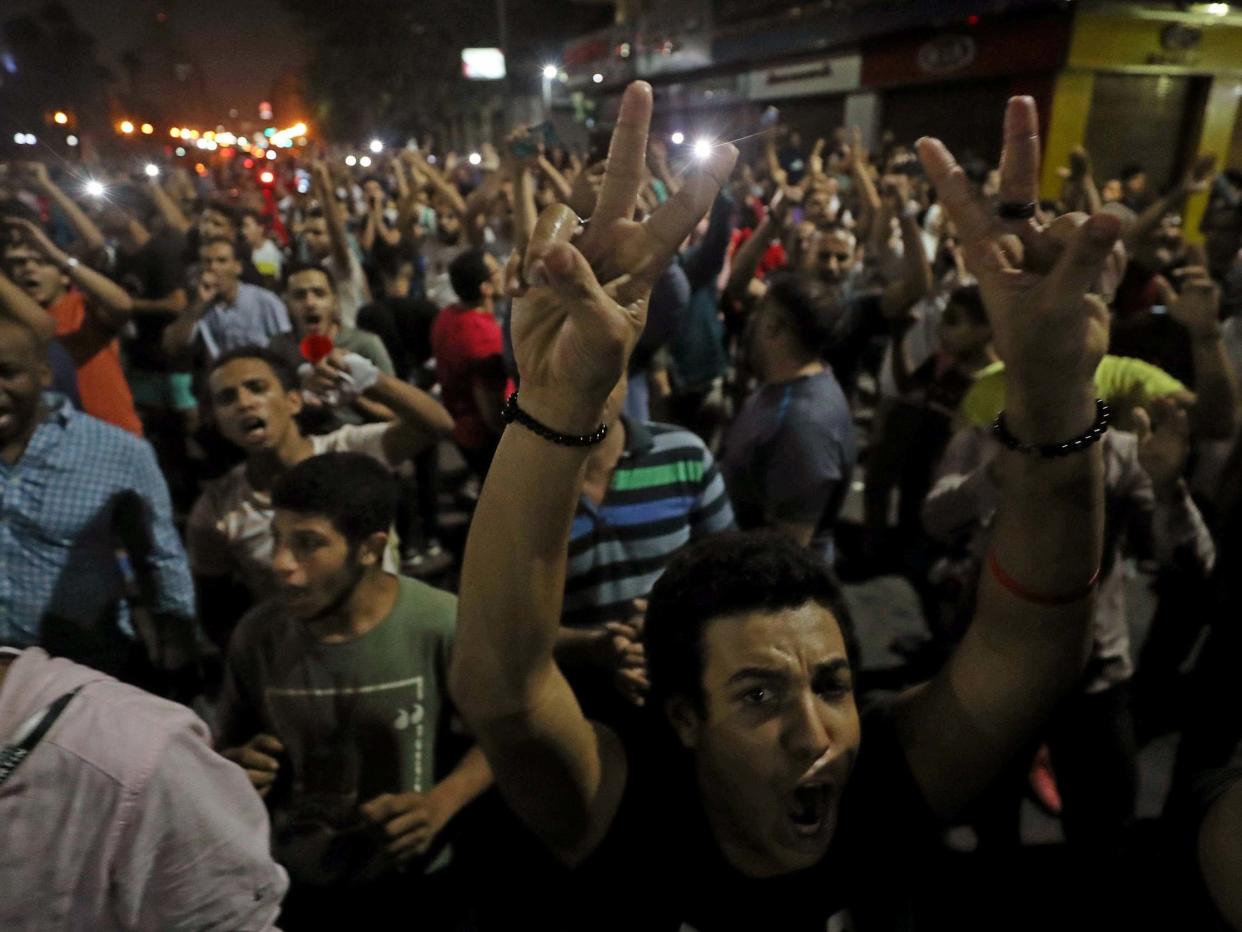Western leaders, take protests in Egypt as a warning – Sisi was never a force for stability in the Middle East

Simmering aspirations for democracy and economic justice underlie the small anti-government protests that broke out over the weekend against Egyptian president Abdel-Fattah el-Sisi’s autocratic regime. The protesters, chased by baton-wielding police, chanted the slogans of the Arab Spring uprisings as they stomped on banners bearing Sisi’s image.
“They’re very, very brave to go into the streets because it’s extremely dangerous,” said one Cairo-based activist. “This is extremely significant. These numbers, no matter how small, show a bigger, bolder move than other huge protests that have been safe.”
It was not some high-minded call for change by democracy activists that prompted Egyptians in multiple cities to challenge Sisi’s security forces in the streets en masse for the first time in several years. The spark was a series of videos alleging corruption and waste by a rough-and-tumble contractor and occasional actor named Mohamed Ali.
Read more
‘They’ll be cut’: Egyptian minister threatens to behead dissidents
Speaking from exile in Spain, he used the gritty vocabulary of a street vendor who lost all his wares to a corrupt cop to describe how Sisi and his coterie of generals bilked him of $13.3m, bankrupted his company, and continue to squander the country’s resources by building themselves palaces with public money.
The aggrieved businessman named names, and massive construction projects, spelling out how Sisi and his top brass allegedly squandered money on a seven-star hotel owned by the military intelligence branch as well as personal palaces and villas for the officers, pocketing money along the way.
“They shattered my dreams and pushed me to leave my country, fearing that they would harm me and my children,” Ali said on his Facebook page in one in a series of videos and posts that began 2 September and continued until he called for the protests on Friday.
Despite attempting to censor the videos, they went viral – egged on no doubt by supporters of the Muslim Brotherhood driven into exile by Sisi’s unprecedented crackdown on civil society. They have been plotting against Sisi from abroad since they were ousted from power in 2013 and merciless hunted down.
But the contractor Ali, with his insider’s tale of intrigue and graft within the halls of power, is no Muslim Brotherhood, and managed to connect to ordinary people in a way the Islamists have been unable to for years.
Egyptian analysts say that Sisi’s reaction to the allegations was symptomatic of an arrogant tone he takes on when he addresses the Egyptian people. “Yes, I am building new palaces,” he said confidently in a 14 September appearance. “They are not for me. I am building a new state.”
Sisi’s style is different from the consensus-building manner of Egypt’s long-time autocrat Hosni Mubarak, and it’s long begun to grate on the nerves of Egyptians of all classes. He came to power following a popularly-backed 2013 coup against the elected government of the Islamist Mohamed Morsi, and has been grown steadily more authoritarian over the last six years, jailing or sidelining any potential opponents, and silencing even whispers of public discontent.
Just days before the protests, Mosaad Abu Fagr, an activist in Egypt’s volatile Sinai Peninsula, posted a video alleging corruption in the army’s fight against militants, accusing Sisi’s son Mahmoud of profiting from the smuggling business to the adjacent Gaza Strip.
“All business that goes to Gaza is Mahmoud and his fronts,” he alleged, adding that another commander had been building himself a luxury villa.
The accusations enraged Egyptians soldiering through hard times. Despite plaudits by ratings agencies and western financial analysts who hail Egypt’s austerity measures and growth rates, according to Egypt’s own statistics, 5 per cent of the country has fallen into poverty over the last several years. The World Bank estimates 60 per cent of Egyptians are impoverished.
http://players.brightcove.net/624246174001/default_default/index.html?videoId=5837728067001
Support free-thinking journalism and attend Independent events
“Everyone following Egypt over the past few years knows it’s a boiling pot,” said Amr Magd, Egypt researcher at Human Rights Watch. “Sisi is an authoritarian leader very different from Mubarak. Sisi has real psychological and emotional issues. It’s not just about ruling the country. It’s about absolute control.”
Western countries have bet big on Sisi’s Egypt as a force for “stability” in the Middle East.
The UK has approved some £141 million in arms sales, including weaponry that could be used against street protests, according to the Campaign Against the Arms Trade, an advocacy group. The US and France also sell Egypt weapons totalling billions, money that could be used to ameliorate the suffering of the Egyptian people.
President Donald Trump reportedly described Sisi as his “favourite dictator,” as he and other world leaders embraced the Egyptian leader at the recent G7 summit.
But that a couple of loudmouths in homemade videos can trigger so much unrest should give pause in western capitals that continue to bank on Sisi.
Read more
Read more ‘They’ll be cut’: Egyptian minister threatens to behead dissidents

 Yahoo News
Yahoo News 

